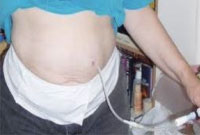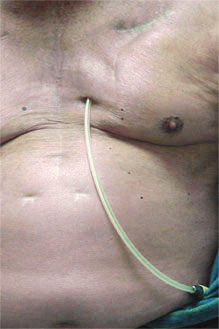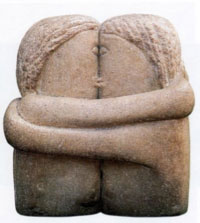Coping with Body Image Changes
 Kidney failure
will
change your body in some way, which can take some getting used to. Any type of treatment you do will require surgery and leave a scar. With peritoneal dialysis (PD), you need a
catheter
(tube). Some people gain weight, too. But you are more than your body! Coming to terms with your body image can help you succeed on PD.
Kidney failure
will
change your body in some way, which can take some getting used to. Any type of treatment you do will require surgery and leave a scar. With peritoneal dialysis (PD), you need a
catheter
(tube). Some people gain weight, too. But you are more than your body! Coming to terms with your body image can help you succeed on PD.
Dealing with Loss
When your kidneys fail, you are coping with a loss. You may feel as if your body has let you down, or that you let your body down. Either way, it is very normal to grieve for the life you thought you would have. You may even go through some of the classic stages of grief. These can happen in any order, and may occur more than once:
- Denial – This is not happening!
- Anger – Why should this happen to me? It's not fair!
- Bargaining – If I can just do _______
- Depression – Why even bother to go on if I have to be like this?
- Acceptance – If this is going to happen, I may as well get ready.

How can you learn to accept kidney failure? Feel your feelings. Trying to hide them or cover them up will just slow you down. Cry if you need to. Make a list of losses and grieve for each of them. Talk to your loved ones, social worker, other patients, or a clergy person for support.
Seek information, too. If you choose a treatment that is a good fit for your life, your life can look a lot like it did before. Don't assume you can't do the things you want to do. Set your priorities and choose a treatment to fit. Then find out what limits—if any—you will really have.
PD Catheters and You

"The catheter is small—I can wear an evening dress and no one notices that there is a tube under it. I still do aerobics, and line dance. People don't know I have kidney problems."
"When I first walked around my bedroom with that silly tube sticking out of me, I felt really horrible. Then I realized I was still ME. I was happy doing PD until I got a transplant."
In the midst of all this coping, you may need to make a treatment choice. PD is gentle, easy on your heart, and work-friendly. Some people don't choose PD because they can't get past the thought of a tube coming out of their bellies. It would be a shame to miss out on PD if the catheter is something you can come to terms with. PD can give you a good quality of life.

Here are some tips that may help you:
- You are still you. A PD catheter does not change who you are.
- The catheter may not look as bad as you fear it will. Look at our photo. The tube is very small.
- The catheter does not show under clothes. People don't know you have one unless you want them to know.
- You can tuck the tube into a soft, fabric PD belt so it does not catch on clothes. You can also use a belt to keep a catheter safe and out of the way during intimacy. See some PD belts here
- A presternal catheter is placed in the chest instead of the belly. Some people find this a less off-putting choice. Women can tuck it into a bra.
PD and Weight Gain
"I am on PD. I went from a size 14 to a size 10, and I don't look pregnant. Not all people look fat around the belly on PD."
PD fluid has sugar (dextrose) in it. The higher the percentage of sugar, the more calories are in each bag. You may absorb just 38 calories from a bag of 1.5% fluid. The 2.5% fluid may give you 64. But if you need to use a lot of 4.25% fluid, you add 144 calories per bag. If you don't change what you eat, you can gain weight on PD.
One of the biggest pluses of PD is getting to eat and drink in a more normal way than with standard in-center HD. Talk to your dietitian if you worry about weight gain on PD. S/he can help you work out a plan that lets you eat foods you enjoy without risking weight gain.
PD and Belly Size

Even if you don't gain weight, your belly may look bigger. A recent study found that it doesn't really get much bigger1—just an inch and a quarter, or about a pants size.
It's no fun to look pregnant when you're not (or when you are a man). Some things to think about that may help are:
- Building strong belly muscles can help flatten your stomach. Don't exercise when you're full—you could strain yourself. Talk to your doctor about exercise you can do when you're empty. Ask for a physical therapy referral to help you.
- Doing exchanges by hand? Perhaps you could use a cycler. If you can stay empty during the day, your belly will be flatter when you're out and about.
 Dress to look your best2:
Dress to look your best2:
- Buy the right size clothes or you will look bigger than you are.
- Look for lines that skim past your belly—not cling to it. If you wear skirts, choose straight or slim ones. Dresses? Look for a straight sheath.
- High waist, or Empire cuts work better than lo-waist ones.
- Square cut jackets with straight lines may fit you better than jackets that nip in at the waist.
- Don't draw attention to your middle with fussy belts or ties.
- Highlight your assets—a slender neck, strong shoulders, toned arms... Try a crossover top if you're a woman with a nice bustline.
- Watch your posture! Standing up straight and tall can take off pounds.
- Avoid pants with pleats and pockets. A flat front will flatter you more. Narrow or tapered legs also help.
You and Your Partner

"I'm 38 years young and still lead an active life. And since my cath was put in, I've had more intimacy (with my wife of course) than I can remember!!"
"My boyfriend of 4 1/2 years is so supportive and understanding - he's never flinched or said anything remotely negative about how I look, and insists that I'm still attractive to him."
"Sam is still as sexy to me as he ever was—even with that tube coming out of his pot belly. We have an active and satisfying sex life. To us it includes holding hands, caressing, flirty looks, smooches, intercourse—verbally and physically ...He is not just a body, he is my soul-mate and partner. That is what makes him so wonderful and lovable."
"When I first saw the catheter, I really liked it, because its keeping my husband alive and hopefully living a comfortable life. It's his lifeline and I am sooo grateful its there... We both like his tube!"
Many people who have kidney failure have changes to their sex lives. (You can read about this in our other article, Hitting below the belt: Home dialysis and sexuality.)
How you feel about yourself can have a lot to do with how much support you get from a partner. It should be no surprise that when your partner says—and shows—that s/he loves you, you feel better about you.
Talk to your partner if you have one. Don't assume that s/he is put off by a PD catheter or a pot belly. Would you love your partner if s/he was the one who had kidney failure? Give him or her a chance to support you. If you find that your partner puts you down or rejects you, then you may need to think about whether you are with the right person.
No partner? Please don't assume that now you never will have one because you're "damaged goods." Not one of us is perfect. We all have our flaws, and that's what makes us who we are. If you believe you have value, others will, too.
Here's what one person on PD said:
"I am dating. To me, my PD catheter is a proudly worn battle scar that helps make me a unique person. When I meet someone new, I lay all my cards on the table. It is much easier to proceed from there. Some do tuck tail and run when they learn of my impairments but that just saves me from any greater trauma later on and they just weren't my type. Maybe it takes a little courage to overcome fear of rejection."
Conclusion
Any type of treatment for kidney failure will cause some change to your body. You have losses that you will need to cope with, but you are still YOU. With PD, you need to weigh the catheter and possible weight gain against the chance for a good quality of life.
References:
- Nurmi J, Korkella M, Honkanen E, Lindgren L, Castren M. Effect of peritoneal dialysis on abdominal circumference. Perit Dial Int. 2010 Mar;30(2):215-7.
- How to Dress to Minimize a Large Stomach eHow.com Accessed 9/2010.

